[h=1]The man who made 'the worst video game in history'[/h]By Richard HooperBBC World Service
- The video game of Steven Spielberg's ET is considered to be one of the worst of all time and has even been blamed for triggering the collapse of Atari. Howard Scott Warshaw, the gifted programmer who made it, explains how it was rushed out in a matter of weeks - and how he feels about those events in California now.
Spielberg was unimpressed.
"Couldn't you do something more like Pac-Man?" he asked.
It was July 1982 and Atari, then one of the world's most successful tech companies, had just paid a reported $21m for the video game rights to Spielberg's new blockbuster, ET the Extra-Terrestrial.
Howard Scott Warshaw was the programmer tasked with designing the game.
"I was stunned," says Warshaw. "Here was Steven Spielberg, one of my idols, suggesting that I knock off the game! My impulse was to go, 'Well, gee, Steven, couldn't you make something more like The Day The Earth Stood Still?'"
Warshaw's stock was high at Atari. The 24-year-old had just finished the video game of Spielberg's Raiders of the Lost Ark. Spielberg considered Warshaw a "certifiable genius" and 36 hours earlier Warshaw had been hand-picked for their next collaboration.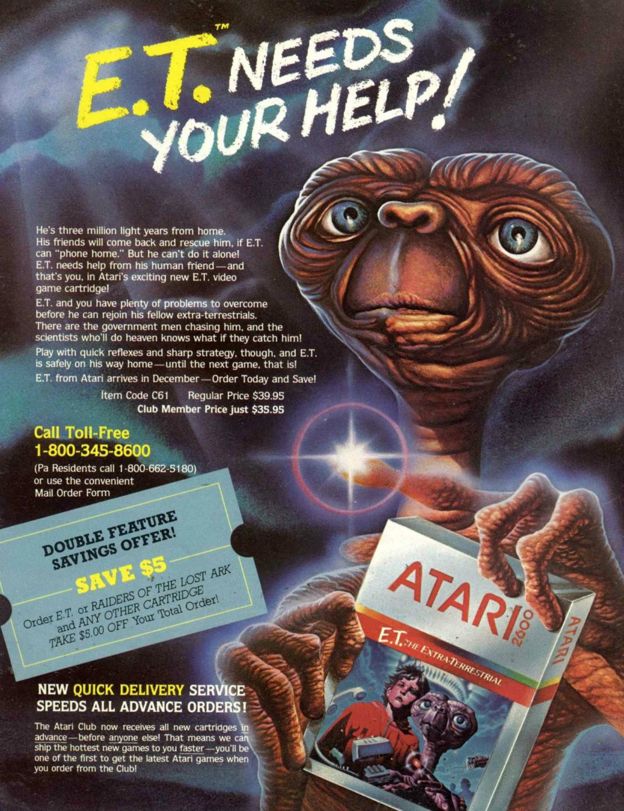
"It was a day that will live in infamy in my life forever," says Warshaw. "I was sitting in my office and I get a call from the Atari CEO. He said, 'Howard, we need the ET video game done. Can you do it?'
"And I said, 'Absolutely, yes I can!'"
Games for the Atari 2600 were distributed on cartridges that took weeks to manufacture. If ET was to be in the shops for Christmas, Warshaw had a tight deadline.
"The CEO goes, 'We need it for 1 September.' That left five weeks to do it! Normally it'd be six to eight months to do a game, not five weeks.
"Then he said, 'Design the game and on Thursday morning, be at the airport and there will be a Learjet waiting to take you to see Spielberg.'
"I'm not sure exactly what I was full of but whatever it was, I was overflowing with it."
Image copyrightDave StaugasWarshaw drew up his pitch to Spielberg, and travelled from the Atari headquarters in Sunnyvale, California to Los Angeles. His idea was an adventure game in which the player had to help ET phone home by collecting components to make an inter-planetary telephone. The player would have to dodge government agents and scientists in order to complete the mission.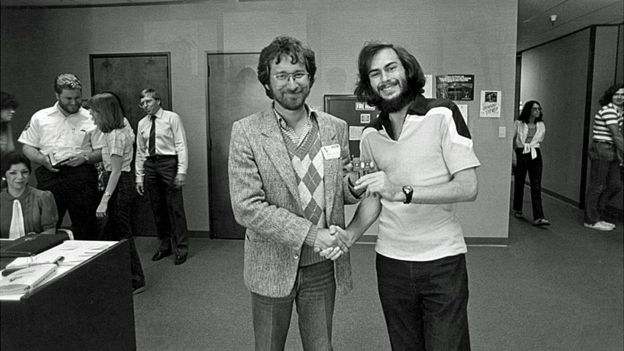
"I got down to Spielberg and I laid out the whole design," he says. "I told him, 'I think it's really important that we do something innovative. ET is a breakthrough movie and I think we need a breakthrough game.'
"I talked him out of the idea of a Pac-Man knock-off. But the key was to design a game that I could deliver in five weeks."
Atari needed ET to be a hit. In 1982 sales had reached a peak of $2bn but the company was losing market share to home computers like the Commodore 64, which could do more than play games.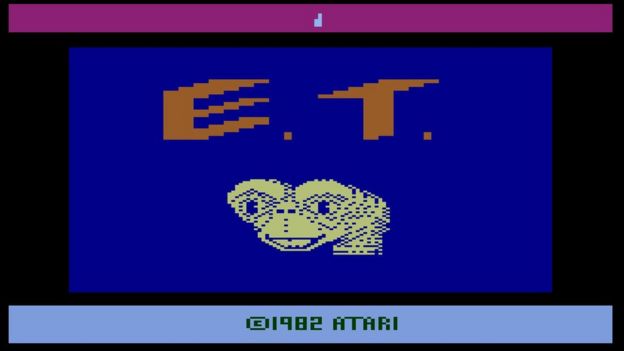
"It was the hardest I've ever worked on anything in my life," says Warshaw, who was the game's sole programmer. "I started working at the office but after a while I realised there was a problem; I still have to go home to sleep and eat occasionally.
"So we had another development system installed in my house so that I would never be more than two minutes away from working on the code except when I was driving.
"There was a manager who was assigned to make sure I was eating so that I'd be able to keep going.
"When it came to the end of the process, my reaction was, 'Wow, I did it!'"
Atari ordered an initial run of four million copies and budgeted a reported $5m on what would be, at the time, the biggest-ever advertising campaign for a video game.
"ET needs help from his human friend - and that's you!" read the magazine ad. Television commercials ran for weeks. Spielberg himself appeared in a promotional video, whilst Warshaw was flown to the London premiere of ET and given a seat in front of the Princess of Wales.
"The bosses believed that as long as we put anything out the door with ET's name on it would sell millions and millions," he says.
To begin with, the game was "right up there on the Billboard top sellers" but word began to spread that there were serious problems.
Image captionHoward was flown to the London premiere of ET in December 1982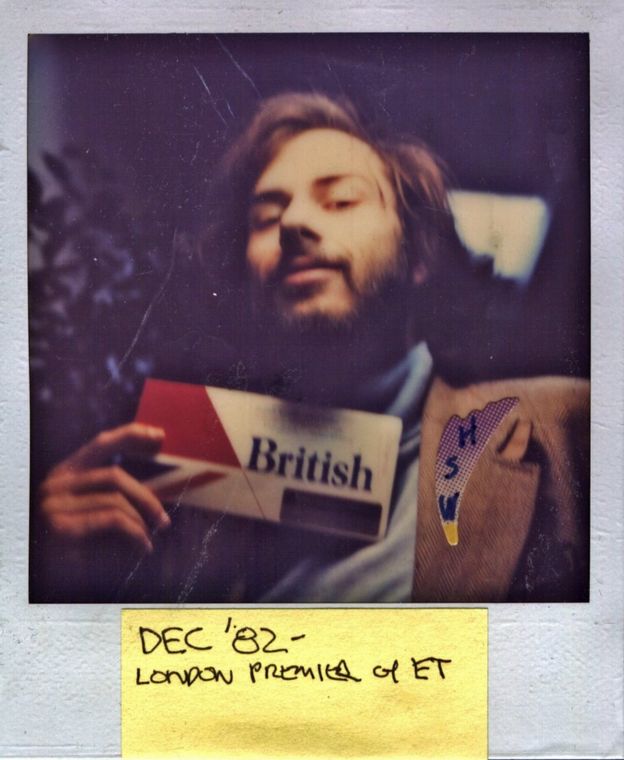
 "It was a finished game but it certainly wasn't perfect," Warshaw says. "There were too many opportunities where you could suddenly wind up in an odd situation. That was too much for a lot of people and caused them to put the game down."
"It was a finished game but it certainly wasn't perfect," Warshaw says. "There were too many opportunities where you could suddenly wind up in an odd situation. That was too much for a lot of people and caused them to put the game down."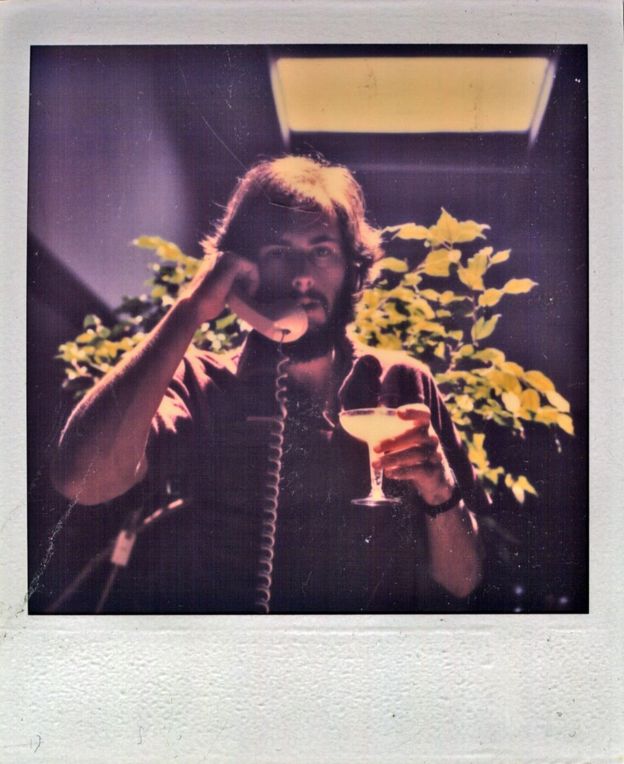
Players complained that the ET character would inexplicably fall into pits and get stuck. As one 10-year-old told The New York Times: "It wasn't fun."
Image captionOne of the infamous pits that players had trouble avoidingAtari soon realised that ET was not going home. In early December 1982 it announced "disappointing" sales for the year and the value of its parent company Warner Communications plunged. The results triggered steep drops in the value of other video game makers.
"After the Christmas season it was starting to come back from retailers," says Warshaw. "It still sold nearly 1.5 million units, but when you needed to sell four million, that's not good enough."
By the second quarter of 1983, Atari's parent company announced losses of $310m.
"Things just started to unravel," says Warshaw. "It's awesome to be credited with single-handedly bringing down a billion-dollar industry with eight kilobytes of code. But the truth is a little more complex."
http://www.bbc.com/news/magazine-35560458/
